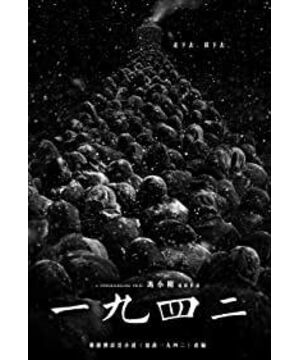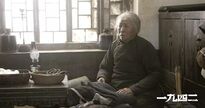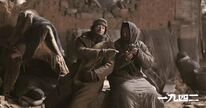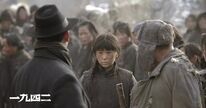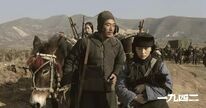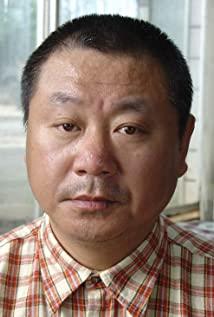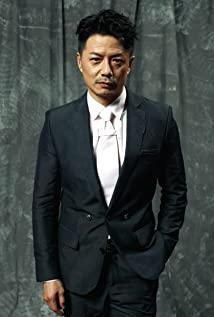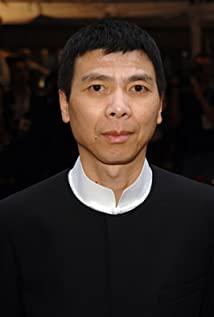"Private" doesn't talk about it, it's too bad, like a piece of rotten tofu, it can't be lifted up, can't be held up, even if it's thrown, it can't be heard. There's a lot to talk about in "1942" -- I mean from the screenwriter's point of view. I'll pick a few briefly.
The script is simply the characters and the plot. Regarding the relationship between the two, different people will have different understandings. Some people say that the plot serves the characters, -- the change of the plot is to let the audience understand the characters; some people say that the characters serve the plot,-- In the world created by the movie, once the plot starts to happen, everyone in it can't help but react.
But in any case, the fundamental view is that the character building and the progression of the plot should be reasonable (that is, the world created in the movie). This is why I say that "1942" is more like a documentary than a movie, because a documentary is to show and restore the truth of the matter, and the characters and plots are not likely to be shaped (but will be rearranged).
Obviously, "1942" is an epic movie, and the common denominator of this type of movie is that it has a God's perspective, overlooking the world framed by the movie from a big picture (do many people suddenly understand why "Harry" Potter's pattern is getting bigger and bigger, but it doesn't have the momentum of "The Lord of the Rings"), and then through a certain character or certain characters in the film to show the core idea of the film.
From this perspective, let's find out what is the core idea of this movie? I guess (really I can only guess), that is the world of those who win the hearts of the people. The last subtitles were typed, and Chiang Kai-shek finally retreated to Taiwan. In fact, the implied meaning was that he did not win the hearts of the people (there is a disaster in Henan, and food has to be raised). Under this big core idea, there may also be some side ideas, such as upholding the truth (American journalist Bai Xiude finally won the Pulitzer Prize), such as the recovery of human nature (the relationship between the old club and the villagers who fled together), such as The annihilation of human nature (KMT officer Jiang Dingwen).
If these truths are made clear through the combination of all these characters and plots, then "1942" is undoubtedly an excellent epic film, but unfortunately Liu Zhenyun's script is completely graphic of his novel (the most outrageous he finally With a sound, such a big pattern, he was stunned to change it into a short parent).
If you follow the idea of what I guess the movie is going to express, then you have to reorganize all the characters. Among them, Jiang Dingwen and Li Peiji are the main characters (the main characters and the main actors are two concepts that are not related to each other. The main characters can appear for a short time, but they represent the main direction of the film). There is a very important sentence in Jiang Dingwen's film, "The country is poor and weak, and only by throwing away the burden can we take care of the overall situation." But when he said this sentence, there was no acting opponent, and there was no dramatic conflict. In other words, this sentence can be called It was a word for drama, and it flowed away indifferently.
I think this sentence should be arranged in this way. Jiang Dingwen said this sentence to Li Peiji, and Li Peiji replied cautiously, "The burden, it is because the hearts are not together, and it is twisted into a rope, which is the strength to resist Japanese pirates." In one round, the theme of the movie was revealed, and in the final subtitles, Chiang Kai-shek's retreat to Taiwan would not seem abrupt (although we know such historical facts).
I think Li Peiji's character setting is still well done in the movie, but it is a bit kitsch. Some "heaven and earth are not benevolent, and regard all things as dogs; saints are not benevolent, and they regard the common people as dogs." For example, when the county officials were arguing about how to distribute food, Li Peiji did not participate in the discussion and quarrel, but just quietly looked at the birds outside the window and silently said to his secretary: "I am looking for food, but I can't find food, this bird. It's time to know the family." This implies the ending of the old club, and it also shows that he has plans to hang up his boots and leave.
The setting of Chiang Kai-shek's character and all the plots surrounding him are, in my opinion, a failure.
The relationship between the stud and the flower branch is inexplicable. It's not impossible for Shuan Zhu to die for Huazhi's children, but he must have an emotional foundation, otherwise, the sadness will not be successful, but it will be funny. This question will not be written openly. It involves professional parts such as character arcs. It is difficult to understand if it is simple to write, and no one will pay for it if you write too much.
The character Bai Ruide has not yet arrived. He should be in such a contradiction, that is, when the country is in trouble, but resources are limited, should it be for the interests of the country, prior to the army, or for the interests of the people, prior to the people. Based on such contradictions, Reid and the priest can raise the film's idea from the theological (or philosophical) point of view, and they can also exploit the interests of the American market. At the same time, they finally invited Tim Robbins, no matter how hard they used it. Use him, now well, a whole vase.
Finally, let's talk about the character of the old club. When I saw the end, another movie "Alive" suddenly popped into my mind. The old club in the movie is very similar to the wealth of the novel "To Live", but the movie "To Live" is well adapted (there is a screenwriter of Reed, of course, this is the huge difference between a professional and a non-professional.). After the character of the old club has experienced so many things, has there been any essential change in the whole person? Arguably no. Then the existence of this character is as light as white water. A character without dramatic conflict is difficult to impress the audience. If the audience is willing to watch such a character, either this character is an AV actress, or the audience is this actor brain powder. Obviously, Zhang Guoli doesn't quite fit, especially the first one.
If you want a character to have dramatic conflict, you must put him in a dilemma (not a good person or a bad person, that is not a dilemma, but a dilemma like saving the wife or saving the child). This character is actually well set, but the setting in the movie is very unsuccessful. For example, at the beginning, his son wanted to molest Huazhi, but he did not stop him because he felt that the poor should be molested, but then when he fled, he He spoke to Shuan Zhu (his long-term worker) in a low voice, and this plot should be moved back. There are many others, but the theory is about characters.
The ending is that the old club accepted a little girl as a granddaughter. This ending is still good, showing the continuation of life, but it is not shocking enough. It might be better if it was changed like this. The old boss went home against the flow of people (not the painless one), and there were dead corpses scattered on the roadside, but he was so numb that he would not take a second look. Suddenly a female corpse came into his eyes, because the female corpse was in her arms. A newborn baby, he thought of his granddaughter, walked over slowly, grabbed the soil, and tried to cover it up slowly. The baby twitched and cried softly, but it turned out not to be dead. The old boss picked up the baby, and while walking, he said, "Granddaughter, grandpa took you home." A barren land, snowing all over the sky, the picture fades out, and the play ends.
Feng Dao actually adhered to the traditional Chinese literati's bad style, that is, "learning and becoming an official". After familiarizing himself with the Four Books and Five Classics, he can know everything and be omnipotent. According to the distance of the rivers and lakes, it can be judged whether the widow Ma has an affair, and the height of the temple can share the worries of the king and retire the Xiongnu thousands of miles. Unfortunately, the ideal is Sister Furong, and the reality is Sister Furong after PS. There are only eternal movies, there is no omnipotent director, you are the only one, that is the immaturity of the market. If Michael Bay was asked to torture humanity and Spielberg made a teenage comedy, wouldn't this be a dog wearing a gnat and fooling around blindly? Why? Because that market is mature.
Finally, why do I give this riddled film five stars. This is because everyone understands the film, but everyone doesn't understand the subject very well. Those who win the hearts and minds of the people lose the world. Not all of us are the pillars with the spirit of international communism. It is very possible that we are all chefs and chief judges, old horses. I can't say more, think about it yourself.
View more about Back to 1942 reviews


